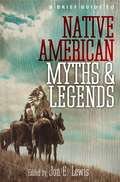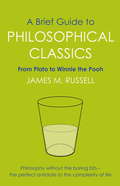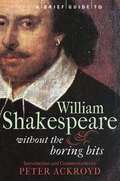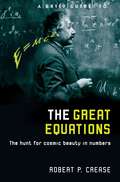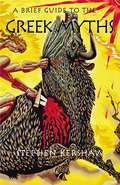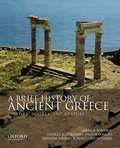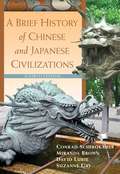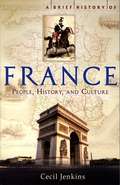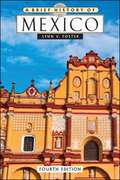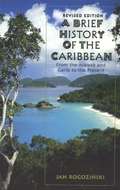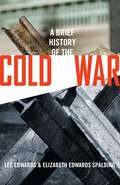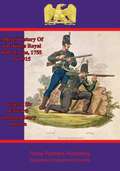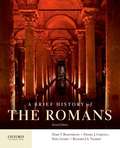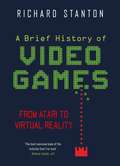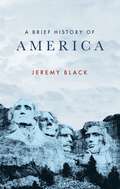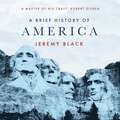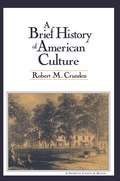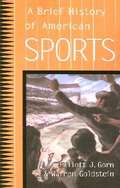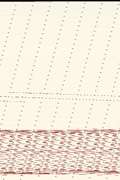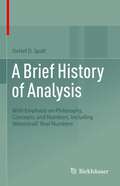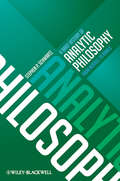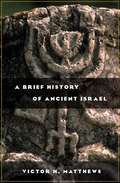- Table View
- List View
A Brief Guide to Native American Myths and Legends: With a new introduction and commentary by Jon E. Lewis (Brief Histories)
by Lewis SpenceIn this brilliant reworking of Lewis Spence's seminal Myths and Legends of the North American Indians, Jon E. Lewis puts the work in context with an extensive new introductory essay and additional commentary throughout the book on the history of Native Americans, their language and lifestyle, culture and religion/mythology. He includes examples of myths from tribes omitted by Spence, a guide to tribes and their myths by region, a basic Lakota (Sioux) glossary, guides to key pronunciations and a bibliography.
A Brief Guide to Philosophical Classics: From Plato to Winnie the Pooh (Brief Histories)
by James M. RussellBig ideas sometimes come from the strangest places. In this wide ranging introduction, James M Russell takes the fear out of philosophy and selects seventy-six works - from Plato, Descartes and Wittgenstein to Philip K Dick and the Moomins as well as contemporary thinkers such as Peter Singer and John Rawls. Dividing into accessible sections - history, contemplation, happiness, and -isms, Russell gives us the lives as well as the lessons of the great thinkers, including a digest of their key ideas. A perfect antidote to the complex life.The topics and books covered include:Traditional Philosophy:The Republic, Plato; The Confessions, St Augustine; The Leviathan, Thomas Hobbes; On Liberty, John Stuart Mill; Philisophical Investigations, Ludwig Wittgenstein; Critique of Pure Reason, Immanuel Kant.Outsiders:Fear and Trembling, Soren Kierkegaard; Beyond Good and Evil, Frederick Nietzsche; The Outsider, Albert Camus; Doors of Perception, Aldous Huxley.Contemplation as Philosophy:The Prophet, Kahil Gibran; Jonathan Livingston Seagull, Richard Bach; Zen and the Art of Motorcycle Maintenance, Robert Pirsig; The Tao of Pooh, Benjamin Hoff.The Continental Tradition:The Prison Notebooks, Antonio Gramsci; The History of Sexuality, Michel Foucault; Symbolic Exchange and Death, Jean Baudrillard.How to Live Your Life:The Art of War, Sun Tzu; Maxims, La Rouchefoucauld; Memories, Dreams, Reflections, Carl Jung; On Sexuality, Sigmund Freud; On Becoming a Person, Carl Rogers.Political and Personal Issues:Das Kapital, Karl Marx; Being and Nothingness, Jean Paul Sartre; Gaia, James Lovelock.Modern Philosophy:A Theory of Justice, John Rawls; Darwin's Dangerous Idea, Daniel Dennett; After the Terror, Ted Honderich.
A Brief Guide to Philosophical Classics: The Thinking Person's Guide To The Great Books Of Philosophy
by James M. RussellBig ideas sometimes come from the strangest places. In this wide ranging introduction, James M Russell takes the fear out of philosophy and selects seventy-six works - from Plato, Descartes and Wittgenstein to Philip K Dick and the Moomins as well as contemporary thinkers such as Peter Singer and John Rawls. Dividing into accessible sections - history, contemplation, happiness, and -isms, Russell gives us the lives as well as the lessons of the great thinkers, including a digest of their key ideas. A perfect antidote to the complex life.The topics and books covered include:Traditional Philosophy:The Republic, Plato; The Confessions, St Augustine; The Leviathan, Thomas Hobbes; On Liberty, John Stuart Mill; Philisophical Investigations, Ludwig Wittgenstein; Critique of Pure Reason, Immanuel Kant.Outsiders:Fear and Trembling, Soren Kierkegaard; Beyond Good and Evil, Frederick Nietzsche; The Outsider, Albert Camus; Doors of Perception, Aldous Huxley.Contemplation as Philosophy:The Prophet, Kahil Gibran; Jonathan Livingston Seagull, Richard Bach; Zen and the Art of Motorcycle Maintenance, Robert Pirsig; The Tao of Pooh, Benjamin Hoff.The Continental Tradition:The Prison Notebooks, Antonio Gramsci; The History of Sexuality, Michel Foucault; Symbolic Exchange and Death, Jean Baudrillard.How to Live Your Life:The Art of War, Sun Tzu; Maxims, La Rouchefoucauld; Memories, Dreams, Reflections, Carl Jung; On Sexuality, Sigmund Freud; On Becoming a Person, Carl Rogers.Political and Personal Issues:Das Kapital, Karl Marx; Being and Nothingness, Jean Paul Sartre; Gaia, James Lovelock.Modern Philosophy:A Theory of Justice, John Rawls; Darwin's Dangerous Idea, Daniel Dennett; After the Terror, Ted Honderich.
A Brief Guide to William Shakespeare (Brief Histories)
by Peter AckroydAn accessible and entertaining journey through the life, times, and work of the Bard - Enigma. Master of language. The greatest comedian in history? The most famous writer in the world. But isn't he a little bit boring? This is an essential guide for anyone who has previously avoided the Bard, and is the perfect introduction for first time students or seasoned theatre lovers. The book contains a full commentary of all the plays by bestselling and reknowned writer Peter Ackroyd as well as full descriptions of the cast and the drama; not forgetting the best speeches, and the wit and wisdom from across the works. There is also an opportunity to explore the poems and a complete set of sonnets, as well as an investigation of who the dark lady might have been.Contains:The complete sonnets; the greatest speeches; the best lines.Perfect for students struggling through their first play or for theatre lovers anywhere.Entertaining, accessible, Shakespeare without the boring bits.
A Brief Guide to the Great Equations: The Hunt for Cosmic Beauty in Numbers (Brief Histories)
by Robert CreaseHere are the stories of the ten most popular equations of all time as voted for by readers of Physics World, including - accessibly described here for the first time - the favourite equation of all, Euler's equation.Each is an equation that captures with beautiful simplicity what can only be described clumsily in words. Euler's equation [eip + 1 = 0] was described by respondents as 'the most profound mathematic statement ever written', 'uncanny and sublime', 'filled with cosmic beauty' and 'mind-blowing'. Collectively these equations also amount to the world's most concise and reliable body of knowledge.Many scientists and those with a mathematical bent have a soft spot for equations. This book explains both why these ten equations are so beautiful and significant, and the human stories behind them.
A Brief Guide to the Greek Myths
by Stephen P. KershawThe book leads the reader through these vibrant stories, from the origins of the gods through to the homecomings of the Trojan heroes. All the familiar narratives are here, along with some less familiar characters and motifs. In addition to the tales, the book explains key issues arising from the narratives, and discusses the myths and their wider relevance.This long-overdue book crystallises three key areas of interest: the nature of the tales; the stories themselves; and how they have and might be interpreted. For the first time, it brings together aspects of Greek mythology only usually available in disparate forms - namely children's books and academic works. There will be much here that is interesting, surprising, and strange as well as familiar. Experts and non-experts, adults, students and schoolchildren alike will gain entertainment and insight from this fascinating and important volume.
A Brief Guide to the Greek Myths (Brief Histories)
by Dr Stephen P. KershawThe book leads the reader through these vibrant stories, from the origins of the gods through to the homecomings of the Trojan heroes. All the familiar narratives are here, along with some less familiar characters and motifs. In addition to the tales, the book explains key issues arising from the narratives, and discusses the myths and their wider relevance.This long-overdue book crystallises three key areas of interest: the nature of the tales; the stories themselves; and how they have and might be interpreted. For the first time, it brings together aspects of Greek mythology only usually available in disparate forms - namely children's books and academic works. There will be much here that is interesting, surprising, and strange as well as familiar. Experts and non-experts, adults, students and schoolchildren alike will gain entertainment and insight from this fascinating and important volume.
A Brief History Of Ancient Greece: Politics, Society, And Culture
by Jennifer Roberts Sarah Pomeroy Walter Donlan Stanley Burstein David TandyWritten by five leading authorities on the classical world, A Brief History of Ancient Greece: Politics, Society, and Culture, Third Edition, is a shorter version of the authors' highly successful Ancient Greece: A Political, Social, and Cultural History, Third Edition (OUP, 2011). It offers a captivating account of Greek civilization and history in all its complexity and variety, covering the entire period from the Bronze Age through the Hellenistic Era.
A Brief History Of Chinese And Japanese Civilizations
by Miranda Brown David Lurie Suzanne Gay Conrad SchirokauerThis compelling text explores the development of China and Japan through their art, religion, literature, and thought as well as through their economic, political, and social history. The author team combines strong research with extensive classroom teaching experience to offer a clear, consistent, and highly readable text that is accessible to students with no previous knowledge of the history of East Asia.
A Brief History Of France
by Cecil JenkinsA Brief History of France tells the story of the formation of this grand nation through its people, great events, and culture. When we think of France we often evoke images of fine food and wine, the elegant boulevards of Paris, and the chic beaches of St. Tropez, but the largest country in Europe has much more to offer than tourist attractions.
A Brief History Of Mexico
by Lynn FosterA Brief History of Mexico, Fourth Edition brings readers up to date on developments in Mexico, helping them understand the deeper significance of recent events. Since Felipe Calderón took office in 2006 amidst violent protests, his reforms have been aimed at drug cartels, poverty, restructuring the role of government in private businesses, and attempts to foster trade agreements with other nations. Despite the many obstacles it faces today, Mexico has become a democratic nation with checks and balances, free elections, and the ability to build a better future.
A Brief History Of The Caribbean: From the Arawak and the Carib to the Present
by Jan Rogozinski<P>Since Columbus landed in the Bahamas 500 years ago, the history of the Caribbean has been marked by European domination and the ongoing struggle of both native and immigrant islanders for political and economic autonomy. <P>Over the centuries, Spain, the Netherlands, France, Britain, and the United States have vied for sovereignty over the islands and their rich resources, and all have left their indelible mark on the peoples and cultures they touched. <P>Taking this heritage into account, and beginning with the first known Caribbean islanders - the Arawak and the Carib - A Brief History of the Caribbean traces the complex and ever-changing course of events in the region, with in-depth coverage of the social, economic, and political factors that have shaped its history.
A Brief History Of The Cold War
by Lee Edwards Elizabeth Edwards SpaldingThe Cold War was a crucial conflict in American history. At stake was whether the world would be dominated by the forces of totalitarianism led by the Soviet Union, or inspired by the principles of economic and political freedom embodied in the United States. The Cold War established America as the leader of the free world and a global superpower. It shaped U. S. military strategy, economic policy, and domestic politics for nearly 50 years. In A Brief History of the Cold War, distinguished scholars Lee Edwards and Elizabeth Edwards Spalding recount the pivotal events of this protracted struggle and explain the strategies that eventually led to victory for freedom. They analyze the development and implementation of containment, détente, and finally President Reagan's philosophy: "they lose, we win. " The Cold War teaches important lessons about statecraft and America's indispensable role in the world.
A Brief History Of The Kings Royal Rifle Corps, 1755 To 1915
by General Sir Edward Thomas Henry HuttonThe Kings Royal Rifle Corps, or the 2nd Battalion the Royal Green Jackets as they are now known, had a long and proud fighting tradition that they would exchange with no other regiment in the British Army. Originally raised from American colonists in 1756, their skill in fighting the French and their native American allies in the woods in the north of the nascent America was legendary; the regiment was honoured for its distinguished service with the motto "Swift and Bold" by no less a figure as General Wolfe in the Quebec campaign. During the Napoleonic Wars, companies of the 5th Battalion were attached to the divisions of Wellington's army to provide them with tough, resilient experienced skirmishers. After many significant deployments to overseas theatres during the 1800's, the regiment was hugely expanded for service in the First World War during which the men of the KRRC added much lustre to their reputation and no fewer than seven V.C.s.Lt.-General Sir Edward Hutton was a distinguished officer of the British army, aide-de-camp to Queen Victoria and pioneered the use of mounted infantry in the British Army. He was also the first commander of the Australian Army. He wrote this short history of his old regiment in retirement during the early stages of the First World War.Author -- Lt.-General Sir Edward Thomas Henry Hutton 1848-1923Text taken, whole and complete, from the edition published in 1917, Winchester, by Warren and SonOriginal Page Count - 84 pages.Illustrations -- 4 maps and plans.
A Brief History Of The Romans
by Daniel J. Gargola Richard J. A. Talbert Noel Lenski Mary T. BoatwrightHow did a single village community in the Italian peninsula eventually become one of the most powerful imperial powers the world has ever known? In A Brief History of the Romans, Second Edition, Mary T. Boatwright, Daniel J. Gargola, Richard J. A. Talbert, and new coauthor Noel Lenski explore this question as they guide students through a comprehensive sweep of Roman history, ranging from the prehistoric settlements to the fall of the empire in 476. Addressing issues that still confront modern states worldwide - including warfare, empire building, consensus forging, and political fragmentation - the authors also provide glimpses into everyday Roman life and perspective, demonstrating how Rome's growth as a state is inseparable from its social and cultural development.
A Brief History Of Video Games: From Atari to Virtual Reality (Brief Histories)
by Rich Stanton'Stanton writes with terrific verve and precision . . . his understanding of the seductive pleasures of gaming takes us right to its heart.'Maria Bustillos, Times Literary Supplement'The best overview book of the industry that I've read.'Andrew Liptak, io9From the first wood-panelled Pong machines in California to the masterpieces of engineering that now sit in countless homes all over the world, A Brief History of Video Games reveals the vibrant history and culture of interactive entertainment. Above all, this is a book about the games - how the experience of playing has developed from simple, repetitive beginnings into a cornucopia of genres and styles, at once utterly immersive and socially engaging. With full-colour illustrations throughout, it shows how technological advances have transformed the first dots and dashes of bored engineers into sophisticated, responsive worlds that are endlessly captivating. As thrilling and surprising as the games it describes, this is an indispensable read for anyone serious about the business of having fun.
A Brief History of America (Brief Histories)
by Jeremy BlackThe next in this series of admirably concise yet nevertheless comprehensive titles looks at the history of all Americans as well as America; its environmental history and its linkage to economic history; the political shaping of America; and America in the world, from being a colony to post-Cold War America.Black examines the environmental history of America and its linkage to economic history, crucially, the clearing of forests; the spread of agriculture; mineral, coal and iron extraction; industrialisation; urbanisation; and current and growing climate-crisis concerns.He explores the political shaping of America: indigenous American polities; free European and unfree African settlements; the creation of an American State, and its successes and failures from 1783 to 1861; Civil War; democratisation; the rise of the federal Government from the 1930s; the Civil Rights movement from the 1950s onwards, and tensions in more recent governance. The book considers America in the World: as a pre-colonial and colonised space; as a newly-independent power, then a rising international one, the Cold War and the USA as the sole superpower in the post-Cold-War world. These key themes are tackled chronologically for the sake of clarity, beginning with the geological creation of North America, human settlement and native American cultures to 1500; the arrival of Europeans and enslaved Africans to 1770 - the Spanish and French in the Gulf of Mexico and Florida, the English and French, and the Dutch and Swedes further north.The focus then shifts to settler conflicts with native Americans and between European powers leading to a British-dominated North America by 1770. Then the end of European rule and the foundation of an American trans-continental state. The section dealing with the years from 1848 to 1880 looks at the Civil War between North and South, reconstruction and the creation of a new society.Between 1880 and 1920, the United States became an industrial powerhouse and an international power, also a colonial power - the Philippines, Hawaii, Puerto Rico - and a participant in the First World War.The interwar years, 1921 to 1945, brought turmoil: the Roaring Twenties; the growth of Hollywood; Prohibition; jazz; the Great Depression and the New Deal; finally the Second World War. 1945 to 1968 was the American Age, brimming with confidence and success as the world's leading power, but also the ongoing struggle for civil rights. Subsequent years to 1992 brought crisis and recovery: Watergate, the Reagan years and the USA as the sole world superpower.In bringing the book right up to the present day, Black looks at factors that divide American society and economy, though it remains a country of tremendous energy.
A Brief History of America (Brief Histories)
by Jeremy BlackThe next in this series of admirably concise yet nevertheless comprehensive titles looks at the history of all Americans as well as America; its environmental history and its linkage to economic history; the political shaping of America; and America in the world, from being a colony to post-Cold War America.Black examines the environmental history of America and its linkage to economic history, crucially, the clearing of forests; the spread of agriculture; mineral, coal and iron extraction; industrialisation; urbanisation; and current and growing climate-crisis concerns.He explores the political shaping of America: indigenous American polities; free European and unfree African settlements; the creation of an American State, and its successes and failures from 1783 to 1861; Civil War; democratisation; the rise of the federal Government from the 1930s; the Civil Rights movement from the 1950s onwards, and tensions in more recent governance. The book considers America in the World: as a pre-colonial and colonised space; as a newly-independent power, then a rising international one, the Cold War and the USA as the sole superpower in the post-Cold-War world. These key themes are tackled chronologically for the sake of clarity, beginning with the geological creation of North America, human settlement and native American cultures to 1500; the arrival of Europeans and enslaved Africans to 1770 - the Spanish and French in the Gulf of Mexico and Florida, the English and French, and the Dutch and Swedes further north.The focus then shifts to settler conflicts with native Americans and between European powers leading to a British-dominated North America by 1770. Then the end of European rule and the foundation of an American trans-continental state. The section dealing with the years from 1848 to 1880 looks at the Civil War between North and South, reconstruction and the creation of a new society.Between 1880 and 1920, the United States became an industrial powerhouse and an international power, also a colonial power - the Philippines, Hawaii, Puerto Rico - and a participant in the First World War.The interwar years, 1921 to 1945, brought turmoil: the Roaring Twenties; the growth of Hollywood; Prohibition; jazz; the Great Depression and the New Deal; finally the Second World War. 1945 to 1968 was the American Age, brimming with confidence and success as the world's leading power, but also the ongoing struggle for civil rights. Subsequent years to 1992 brought crisis and recovery: Watergate, the Reagan years and the USA as the sole world superpower.In bringing the book right up to the present day, Black looks at factors that divide American society and economy, though it remains a country of tremendous energy.
A Brief History of America (Brief Histories)
by Jeremy BlackThe next in this series of admirably concise yet nevertheless comprehensive titles looks at the history of all Americans as well as America; its environmental history and its linkage to economic history; the political shaping of America; and America in the world, from being a colony to post-Cold War America.Black examines the environmental history of America and its linkage to economic history, crucially, the clearing of forests; the spread of agriculture; mineral, coal and iron extraction; industrialisation; urbanisation; and current and growing climate-crisis concerns.He explores the political shaping of America: indigenous American polities; free European and unfree African settlements; the creation of an American State, and its successes and failures from 1783 to 1861; Civil War; democratisation; the rise of the federal Government from the 1930s; the Civil Rights movement from the 1950s onwards, and tensions in more recent governance. The book considers America in the World: as a pre-colonial and colonised space; as a newly-independent power, then a rising international one, the Cold War and the USA as the sole superpower in the post-Cold-War world. These key themes are tackled chronologically for the sake of clarity, beginning with the geological creation of North America, human settlement and native American cultures to 1500; the arrival of Europeans and enslaved Africans to 1770 - the Spanish and French in the Gulf of Mexico and Florida, the English and French, and the Dutch and Swedes further north.The focus then shifts to settler conflicts with native Americans and between European powers leading to a British-dominated North America by 1770. Then the end of European rule and the foundation of an American trans-continental state. The section dealing with the years from 1848 to 1880 looks at the Civil War between North and South, reconstruction and the creation of a new society.Between 1880 and 1920, the United States became an industrial powerhouse and an international power, also a colonial power - the Philippines, Hawaii, Puerto Rico - and a participant in the First World War.The interwar years, 1921 to 1945, brought turmoil: the Roaring Twenties; the growth of Hollywood; Prohibition; jazz; the Great Depression and the New Deal; finally the Second World War. 1945 to 1968 was the American Age, brimming with confidence and success as the world's leading power, but also the ongoing struggle for civil rights. Subsequent years to 1992 brought crisis and recovery: Watergate, the Reagan years and the USA as the sole world superpower.In bringing the book right up to the present day, Black looks at factors that divide American society and economy, though it remains a country of tremendous energy.
A Brief History of American Culture
by Robert M. Crunden"The discussion of each period is wide-ranging, analyzing movements and spotlighting major figures in politics and philosophy, law and literature, economics and education, jazz and journalism, science and civil rights. A readable, insightful overview of the underlying patterns that give shape to U.S. cultural history. Nonacademic readers will find Crunden's selective bibliographical essay helpful". -- Booklist
A Brief History of American Sports
by Warren Goldstein Elliott J. GornHow sports have changed! At the end of our century, a baseball player won a contract that paid him several million dollars a year; a boxer consistantly earns millions of dollars for a single fight; a television network pays billions and billions to broadcast our national pastime. Two distinguished cultural historians trace the evolution of American play from its English origins through the explosive and controversies of modern sports. From the eariest years, our attitudes about games have been played by major social and cultural forces, religious structures, industrialization, racial and gender discrimination, drug abuse, the growth of the cities, the power of money, and the rise of mass culture.
A Brief History of American Sports
by Warren Goldstein Elliott J. Gorn<p>Elliott J. Gorn and Warren Goldstein show us where our games and pastimes came from, how they developed, and what they have meant to Americans. The great heroes of baseball and football are here, as well as the dramatic moments of boxing and basketball. Beyond this, the authors show us how sports fit into the larger contours of our past. <p>For this new edition, the authors have updated the book to include discussion of performance-enhancing drugs; player salaries, unions, and the business of internationalizing sport; Title IX and gender in American sports; race, especially the entry of Latino and Asian athletes; and the corporatization of amateur athletics. A Brief History of American Sports reveals that from colonial times to the present, sports have been central to American culture, and a profound expression of who we are.</p>
A Brief History of Analysis: With Emphasis on Philosophy, Concepts, and Numbers, Including Weierstraß' Real Numbers
by Detlef D. SpaltThis book explores the origins of mathematical analysis in an accessible, clear, and precise manner. Concepts such as function, continuity, and convergence are presented with a unique historical point of view. In part, this is accomplished by investigating the impact of and connections between famous figures, like Newton, Leibniz, Johann Bernoulli, Euler, and more. Of particular note is the treatment of Karl Weierstraß, whose concept of real numbers has been frequently overlooked until now. By providing such a broad yet detailed survey, this book examines how analysis was formed, how it has changed over time, and how it continues to evolve today. A Brief History of Analysis will appeal to a wide audience of students, instructors, and researchers who are interested in discovering new historical perspectives on otherwise familiar mathematical ideas.
A Brief History of Analytic Philosophy: From Russell to Rawls
by Stephen P. SchwartzA Brief History of Analytic Philosophy: From Russell to Rawls presents a comprehensive overview of the historical development of all major aspects of analytic philosophy, the dominant Anglo-American philosophical tradition in the twentieth century. Features coverage of all the major subject areas and figures in analytic philosophy - including Wittgenstein, Bertrand Russell, G.E. Moore, Gottlob Frege, Carnap, Quine, Davidson, Kripke, Putnam, and many othersContains explanatory background material to help make clear technical philosophical conceptsIncludes listings of suggested further readingsWritten in a clear, direct style that presupposes little previous knowledge of philosophy
A Brief History of Ancient Israel
by Victor MatthewsGrounded in the latest archeological developments, Victor Matthews'sA Brief History of Ancient Israel presents a concise history of Israel covering the ancestral period, conquest and settlement, the monarchy, and both the exilic and postexilic periods. Using supplemental figures and insets, the author concentrates on providing a cogent and condensed discussion of events. He examines historical geography, archaeological data, and, where relevant, comparative cultural materials from other ancient Near Eastern civilizations. With an accessible yet high-quality introduction,A Brief History of Ancient Israel will be of immense value to both students of the Old Testament and the scholars who teach them.
